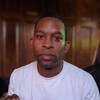Bola Tinubu, looks on in Abuja on March 1, 2023 during celebrations at his campaign headquarters. Photo: KOLA SULAIMON/AFP via Getty Images
Bola Ahmed Tinubu – a controversial former two-term governor of Lagos and political kingmaker – has been declared the winner of Nigeria’s presidential election, a vote that has been marred by voting-machine failure and allegations of irregularities. Tinubu secured just 36 percent of the vote and won only 12 of Nigeria’s 36 states. His main challengers, Atiku Abubakar and youth candidate Peter Obi, also won 12 states each, making it the closest election since Nigeria’s return to civil rule in 1999. Both Obi and Atiku’s parties are calling for the results of the vote to be scrapped. READ MORE: Nigerian Election Outsider Peter Obi Defeats ‘Godfather of Lagos’ In Lagos ItselfTinubu’s controversial victory, announced in the early hours of Wednesday morning, will certainly be challenged in court, which could lead to an extremely messy period in Nigerian politics between now and inauguration day on the 29th of May.Opposition parties have rejected the final result over what they consider to be irregularities in the voting procedure and count. Prior to the election, Nigeria’s voting body, the Independent National Electoral Commission (INEC), had promised a new digital reporting system that allowed results to be seen online, nationwide, and in real-time would ensure transparency. That system largely failed on election day, leading to accusations that votes could have been changed in some large, key states as the paper tallies were transported from polling stations to central offices. On Tuesday, the main opposition parties gave a joint press conference claiming they have evidence to prove that enough significant irregularities occurred to have impacted the result. Poll workers have also taken to social media to claim they were pressured into submitting false results. “I demand that this sham of an election be cancelled and we call on INEC to conduct fresh elections within the window period provided by the electoral act," Julius Abure, the chairman of Obi’s Labour Party, said. The chairman of INEC, Mohammed Yakubu, has been severely criticised for showing little concern for the failure of his much-touted new system. In a statement on Sunday, INEC said the untested system had struggled to cope with the demand on its servers. The final election result will also see a challenge to a yet-untested provision in the constitution that says a winning candidate must win 25 percent “of the votes cast at the election in each of at least two-thirds of all the States in the Federation and the Federal Capital Territory, Abuja.” Whether that means a candidate must specifically win 25 percent of the vote in Abuja – which is technically not a state – or not will be decisive as neither Tinubu nor Atiku secured a quarter of the vote in the capital. If his win is upheld in court, Tinubu – who once claimed he should be elected president because “It’s my turn” – will enter office significantly weaker than he could have ever imagined. His political brand is built on being an untouchable kingmaker, earning him the title of the “Godfather of Lagos”. But after a personally painful defeat in Lagos to Obi – a result many believe is wider than has been reported – and securing the lowest mandate in modern history, the 70-year-old’s political standing appears extremely weak. “Majority of Nigerians rejected Tinubu,” Modupe Odele, a prominent activist during the #EndSARS demonstrations wrote on Twitter, “and he foisted himself there without regard for the consequences.”
Advertisement
Advertisement
Advertisement
Young people across Nigeria who fuelled Obi’s surprisingly strong candidacy have reacted with a mix of disappointment at Tinubu’s victory, but also pride in propelling a third-party candidate to the strongest showing in Nigerian political history. “Anyway, shoutout to Peter Obi, Labour Party and the ‘four people in a room’,” Dami Odufuwa, a co-founder of the Feminist Coalition wrote. “You did the damn thing.”The main opposition parties are yet to officially respond since Tinubu’s win was declared.
